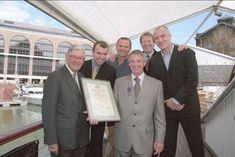
Atlantic kayaker, Pink Lady® rower and former SAS diver Pete Bray, from Pembrokeshire has been awarded with a bronze medal by Julian Spicer OBE, chairman of the Royal Humane Society in recognition for his bravery in the Pink Lady® apples Atlantic row last August.
On August 8 2004 the Pink Lady Atlantic First vessel split in two in a Force 11 storm 300 miles from its Falmouth destination, following a 1,800-mile, 39-day row from Newfoundland, Canada.
Former Royal Marine Mark Stubbs, from Poole, writer Jonathan Gornall, from London and navigator John Wills, from Elstead, Surrey, rowed with Pete Bray, hoping to break the 55-day trans-Atlantic rowing record set more than 100 years ago by two Norwegian fishermen.
The rowers had dodged icebergs, super tankers and even sharks but could not avoid the tail end of Hurricane Alex, the force of which was too much for carbon-fibre boat and its four rowers.
Former crew member Jonathan Gornall said, “I have no doubt Pete saved my life. He then went on to retrieve our life-raft, in the extremely difficult circumstances, which at the very least contributed to, if not ensured, our survival.”
Spicer said: “Pete’s bravery in the face of danger was outstanding and his medal is extremely well deserved.”
Andy Macdonald of Coregeo, sponsor of the Pink Lady Atlantic row, added, ”I have total admiration for these four guys in attempting the row in the first place. I know they spent much time practising and rehearsing just what had to be done in an emergency. It was this training and knowledge which saved all their lives. Imagine the scene…pitch black, very cold, enormous waves. For Pete to help Jonathan, find the emergency gear, find the life raft in all of this was just quite amazing.”
Bray said, “I am gob-smacked. It was a team effort, so I feel more than honored to get the award. I’ve rescued people in the past but it has always been part of my job, so it’s unforgettably special to be recognised by the kind people at the Royal Humane Society in this way.”
Founded in 1774, the society assesses acts of bravery in the saving of human life and makes awards in response to nominations from the public and civic bodies, such as the police.



